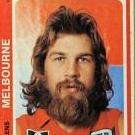
binman
Life Member
-
Joined
-
Last visited
-
Currently
Viewing Topic: MATCH SIM: Friday 6th February 2026
Everything posted by binman
-
PODCAST: Rd 23 vs Hawthorn
Of course it doesn't. I never said it did I said it was a huge factor. By the by, even though the crows are probably the fittest side in the AFL and way way fitter than us it was also a huge factor in that game. The pies dominated big chunks of that game as evidenced by their huge inide 50 differential. The crows, whi i thinkmwill win the flag, were definitely not at their optimal running power.
-
PODCAST: Rd 23 vs Hawthorn
Not as wild as getting banned mutilple times from a football fan forum and feeling compelled to create new profiles, when we're struggling of course, to continue to spew negativity about the club.
-
CASEY: Rd 21 vs Box Hill Hawks
Great win. Well done dees.
-
CASEY: Rd 21 vs Box Hill Hawks
I wish we had a player called Sinema in.our women's team. She'd have her own theme song - Sinnema girl, sung to this tune:
-
Who Will Be Our Next Coach?
Let's say that's true - would make sense because counter intuitively the best thing in that circumstance is to maintain the percentage they had by ensuring we didn't score at all and the best to do so is to slow the game right down (because opening up the game risks your opponent scoring too and say scoring 3 to 2 goals would actually decrease percentage). Makes our effort to score 3 late goals mote meritorious no less so.
-
Who Will Be Our Next Coach?
100% - ridiculous to suggest they put the cue in the rack. Gunston was asked about the importance of percentage in his post match, on ground interview and he said they we're aware of the importance of maximising percentage in terms of their final ladder position (they are on outside chance of finishing top 4 - if they do it will be on percentage. And if they don't percentage might be the difference between playing a home elimination final at the G or an interstate elimination final).
-
POSTGAME: Rd 23 vs Hawthorn
Not to mention completely cooked. The curious thing was how long Chaplin took to change tge match up. Though it has to be said Howes was no better. Couldn't believe the space he gave Gunston. All that said neither May or Howes were helped out by the woeful pressure we applied to the kickers spotting up Gunston or the fact we couldn't get back on turnover and transtion and block his leading lanes.
-
PODCAST: Rd 23 vs Hawthorn
I can't believe it's even a debate. Undeniably a huge factor in the game, particularly given we were coming off all the emotion of the previous week and we have a number of young players desperate for the season to end, not to mention nominally our best defender who looks totally cooked The impact was most evident in terms of the impact on their ability to spread and get back on turnover and our inability to spead, cover their spread and get back on turnover (meaning our all team defence was woeful, the key reason gunston had do many clear leading lanes). Scanning this thread I wish I could say I'm surprised how negative so many posters are about our performance. Most such posts are from people who deride us a woeful bottom 4 team - so a bottom 4 team against team, who were 1.40 to win, comimg of a 9 day break against a team and for whom a win locked in a finals spot and percentage gives them an outside top 4 chance. And people are up in arms about performance - that's some serious cognitive dissonance right there. I was actually really impressed with the way they fought the game out.
-
Simon Goodwin Sacked
That's true. Who is responsible for that?
-
POSTGAME: Rd 23 vs Hawthorn
I was an energetics sceptic, but perhaps I'll need to revaluate.
-
Simon Goodwin Sacked
Yep. And what is the one constant in that entire period?
-
Simon Goodwin Sacked
I reckon that's simple not the case, and its a falsity that drives myth that replacing the coach will address sustained poor performance. I mean there is so little evidence changing coaches results in sustained success that its bizarre the myth, not to mention practice (though AFL clubs are not changing coaches as often now) continues. Just look at the blues and roos for recent examples. How many coaches did both clubs cycle thru in the 5 years before landing on their current saviours Voss and Clarkson, neither of whom have been able to achieve anything remotely resembling sustained success. I wold argue the number one factor in not achieving sustained success is a poorly performing executive. Number two is players. Number three is the high performance team and culture (the latter being influenced by the coach). Number four is the coach. If they don't sort the governance of the club the next coach could be a combination of Norm Smith, Clarkson, Hardwick, Phil Jackson and Sir Alex Ferguson and we'd still have sustained lack of success. Which is this quote from the Caro article posted above is spot on: Whether or not you agree with the decision to sack Simon Goodwin, it cannot be disputed that he coached in often challenging and occasionally untenable conditions. Board discord has punctuated the past six seasons, including 2021 when Goodwin coached the club to its first flag in almost six decades. Surely the next coach will be spared that distraction.
-
Simon Goodwin Sacked
As I have said I see the logic of the board's decision - and God knows I've read enough posts on Demonland over the last two seasons with all the reasons why people think goody was not the right guy and should be moved on. I disagree with many of those arguments but again I get the logic for making a change and will fully back and support whoever they decide will be the new coach. Like Goody, I respect the board's right to make that call and sincerely hope that it proves to be the right decision. Another hypothetical. We appoint Buckley - and by the by I really hope we do as I think he us an excellent candidate. Buck says in his first presser that he has taken the job because he thinks we can win a flag in the near future, expects to be competitive from the get go and believe we can make finals in 2026. Bur instead his message doesn't land, his game plan doesn't work and we win fewer games and finish 2026 near the bottom of the ladder. Is sacking Goody still the right call?
-
Simon Goodwin Sacked
Good points, well made.
-
Simon Goodwin Sacked
Good points, well made.
-
Simon Goodwin Sacked
That's where we differ doc. I see the logic in sacking Goody, will back in whoever they choose, but imo there simply is not enough evidence to assess whether it was a mistake or not. We will only know the answer to that question in the fullness of time.
-
Simon Goodwin Sacked
I think they should have let Goody see out his contract, but that doesn't mean I think the board nesssarily made a mistake. My point really is that we simply don't have enough information to make an assessment on whether it's a mistake or not. Which is exactly why the success or otherwise of a new coach IS of great significance. If say we go with Buckley and don't make finals, or at the very least drastically improve our win loss record (which would see us pushing for finals all season) then the evidence will strongly suggest the decision was wrong.
-
Simon Goodwin Sacked
I completely disagree with both statements, particularly the second. If the next coach does not bring success, and I would argue immediate success, then the decision to sack Goodwin, one of only four coaches that have won a flag in the club's 173 year history who has a proven ability to take this team from near bottom back to the top (near bottom in 2019 after making a preliminary in 2018) and completely retooling the game plan (ironically super attacking to ultra defence) and had not 'list the players' will be an epic fail. Just one reason why is that we have to pay him a million dollars on top of what i imagine will be a similar amount to the new coach severely hampering our ability to surround a new coach with the very best assistants and high performance team. If we don't make finals next year then the opportunity cost for sacking Goodwin, in addition to pouring a million dollars down the drain, includes the lost chance to say do another succession plan with for example Chaplin or Bruce (which I think would have been at least worth considering, particularly given that exact model brought the club its first flag in 57 years just 4 years ago). The board should be judged on its decisions. It decided just two years ago to extend Goodwin’s contract. Sacking him with a year on his contract can only be seen as an admission that was a mistake. If the coach they now appoint does not bring success, and I would argue immediate success by at the least making finals next season, then they will have made another mistake.
-
Farewell Judd McVee
3 or 4 in 5 years is one person few and an another's bugger all
-
PREGAME: Rd 23 vs Hawthorn
Exactly. And I don't really understand the knock on selecting who Chaplin and the selection panel think will give us the best chance of beating the hawks. I for one have suffered thru enough losses to the Hawks and the very last thing I want to see is a bunch of b graders been given a run for [censored] and giggles and to 'see what they've got to offer'. If they haven't forced their way into the team by now thru sustained excellence we know the answer to that question. And besides I also don't get the knock on the idea of ensuring Casey have the very best chance of beating Box Hill Hawks. Casey going deep in the VFL finals, hopefully even winning a flag would, for all sorts of reasons, be a real fillup for the club, particularly if we alsi have a good start to the AFLW season.
-
Farewell Judd McVee
When was the last time a player went to the PSD because a deal couldn't be done?
-
Who Will Be Our Next Coach?
Blimey, I'm convinced. MFC you have your coach!
-
Who Will Be Our Next Coach?
Love it. Only two problems. Any coach, or prompter who thinks Schache is part of the solution can't be allowed anywhere near the club. There is only one Lever.
-
PREGAME: Rd 23 vs Hawthorn
Bloody goody and his love for sharp. Wait a minute......
-
Who Will Be Our Next Coach?
Me too. To protect against some lazy wannabee coach entering a prompt into chatgpt like: Give me a snazzy PowerPoint that includes a five year plan and minimum of two flags





